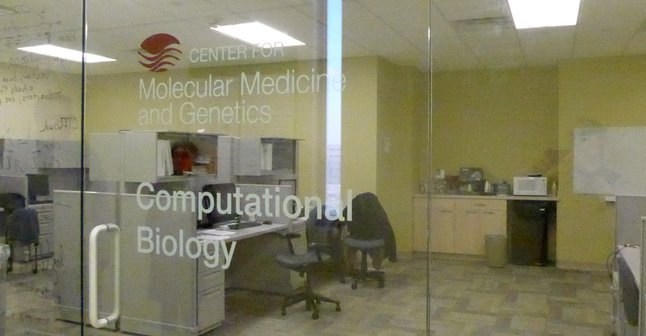Computational Biology
Computational biology is a main focus area of the Center and utilizes and analyzes research data with state-of-the art “in silico” tools to examine large data sets also known as “big data.” The goal is to comprehensively collect and analyze information related to gene and protein function and to gain deep insights into the most crucial processes in the cell and to understand how gene and protein networks control biological systems in health and disease. Bioinformatic and statistical tools are developed and employed by Center faculty to discover the biology underlying human diseases and to detect genetic risk factors. Furthermore, computational structural biology aims at establishing the relations of protein structure, function, disease and evolution. Newly developed computational methods with high-throughput computer clusters allows studying proteins at the atomic level in an unprecedented manner, using theoretical models and molecular dynamics simulations to analyze protein folding, engineering, dynamics, and protein-protein and protein-ligand interactions. Finally, applications of biostatistics tools include clinical trial design and analysis, multiple testing and survival analyses, and high dimensional modeling. The field of computational biology applies data-analytical and theoretical methods, mathematical modeling and computational simulation techniques to the study of biological systems. It draws upon fields such as computer science, statistics, and mathematics to solve or develop insights into problems in biology.
Students interested in this concentration are expected to have some facility with a modern computing language (commonly Python or R), and some background in statistics and linear algebra.
Faculty whose research programs are in this area:
Finley, Russell Jr. Ghosh, Samiran
Lipovich, Leonard Luca, Francesca
Pique-Regi, Roger Tseng, Jeffrey
Students would normally enroll in the following courses during their first 2 years
MGG 7015 Introduction to Genetics (Cr.2)
MGG 7030 Functional Genomics and Systems Biology (IBS 7030)
MGG 7600 Advanced Human Genetics (Cr. 4)
MGG 7050 Bioinformatics: Theory and Practice (Cr. 3)
MGG 7091 Scientific Communication II (Cr. 2)
MGG 7460 Research Training in Molecular Genetics and Genomics (Cr. variable)
FPH 7015 Biostatistics (Cr. 4)
Below are examples of elective courses
MGG 7020 Metabolism and Disease (Cr. 2)
MGG 7400 Molecular Biology of Cellular Signaling (Cr. 2)
MGG 8010 Quantitative Data Analysis for Biological and Medical Sciences (Cr. 3)
MGG 8680 Advanced Topics in Molecular Biology and Genetics (Cr. 1-3)
MGG 8770 Molecular Biology of Mitochondrial Disease (Cr. 2)
IBS 7050 Biomedical Neurobiology (Cr. 2)
IBS 7090 Biomedical Immunology (Cr. 2)
IBS 7100 Biomedical Neuropharmacology (Cr. 2)
IBS 7110 Introduction to the Business of Biotechnology (Cr. 2)
IBS 7115 Special Topics in Biotechnology Commercialization (Cr. 1)
IBS 7140 Foundations of Computational Biology (Cr. 3)
IBS 7140 Foundations of Computational Biology with Matlab Programming


